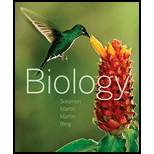
Concept explainers
Test Your Understanding
1. Which of the following is a benefit of gas exchange in air compared with gas exchange in water? (a) air has a higher concentration of molecular oxygen (b) oxygen diffuses more slowly in air (c) no energy is required for ventilation (d) moist respiratory surface is not needed (e) air is denser than water
Introduction: The process of gas exchange that occurs between an organism and its environment is known as respiration. For cellular respiration, most of the animal cells need a continuous oxygen supply. During respiration, oxygen is inhaled from the environment and transported to individual cells of the body. Carbon dioxide produced during the cellular respiration is exhaled from the body to the environment.
Answer to Problem 1TYU
Correct answer: A benefit of gas exchange in air compared with gas exchange in water is that air has a higher concentration of molecule oxygen. Hence, the correct answer is option (a).
Explanation of Solution
Reason for the correct answer:
Option (a) is given as “air has a higher concentration of molecular oxygen”.
The benefit of gas exchange in air over gas exchange in water is due to the following reasons:
- Air medium contains high molecular oxygen concentration at least 20 times more than the water medium.
- Energy requirement is less in air medium than the water medium to obtain oxygen.
- Oxygen diffuses faster in air than in water, as air is less dense and less viscous.
Hence, the correct answer is option (a).
Reasons for incorrect answers:
Option (b) is given as “oxygen diffuses more slowly in air”. Diffusion of oxygen is faster in air than in water, as air is less dense and less viscous than water. Hence, option (b) is incorrect.
Option (c) is given as “no energy is required for ventilation”. Energy requirement for ventilation is less in air medium than in in water medium. Hence, option (c) is incorrect.
Option (d) is given as “moist respiratory surface is not needed”. For gas exchange between air and blood, a moist respiratory surface is essential. Hence, option (d) is incorrect.
Option (e) is given as “air is denser than water”. Air is less dense and less viscous than water. Hence, option (e) is incorrect.
Hence, options (b), (c), (d), and (e) are incorrect.
The advantage of gas exchange in air compared with gas exchange in water is that air has a higher concentration of molecule oxygen.
Want to see more full solutions like this?
Chapter 46 Solutions
Biology (MindTap Course List)
- Test Your Understanding 12. EVOLUTION LINK What are the advantages of having millions of alveoli rather than a pair of simple, balloonlike lungs?arrow_forwardTest Your Understanding 5. Which sequence most accurately describes the flow of air in the human respiratory system? 1. pharynx 2. bronchus 3. trachea 4. larynx 5. alveolus 6. Bronchiole (a) 4, 1, 3, 2, 5, 6 (b) 1,4, 3, 2, 5, 6 (c) 4, 1,3, 2, 6, 5 (d) 1, 4, 3, 2, 6, 5 (e) 1, 3, 4, 2, 6, 5arrow_forwardTest Your Understanding 11. VISUALIZE Draw and label a diagram illustrating the sequence of structures through which inhaled air travels to reach the alveoli.arrow_forward
- Test Your Understanding 13. INTEREPT DATA Look at Figure 46-10b. How would strenuous muscle activity affect the oxygenhemoglobin dissociation curve? (Hint: How does muscular activity affect pH? See Chapter 40 if you need to review this concept.) Figure 46-10 Oxygen-hemoglobin dissociation curvesarrow_forwardIdentify 3 physical conditions that can optimize rate of diffusion of a gas across a membrane, and relate these to Fick’s Law of Diffusion. Please describe 3 ways animal respiratory systems have evolved in order to maximize the exchange of O2and CO2across their membranes.arrow_forwardDistinguish between positive pressure breathing and negative pressure breathing in animals with lungs.arrow_forward
- EVOLUTION LINK Aquatic mammals such as whales and dolphins use lungs rather than gills for gas exchange. Propose a hypothesis to explain why.arrow_forward1. How is hydrogen ion formed? 2. When does oxygen become a major stimulus for breathing? 3. How can an increase in lactic acid increase breathing rate? (Include what chemoreceptors are affected)arrow_forwardBased on the research question: Will the number of bubbles per minute increase or decrease as the % of carbon dioxide increases? State your hypothesis AND explain WHY you expect to see these results.arrow_forward
- Draw your own original diagram to show how the alveoli and the capillaries work together to exchange gases between the respiratory and circulatory systems.arrow_forwardPlease describe 3 ways animal respiratory systems have evolved in order to maximize the exchange of O2and CO2across their membranes.arrow_forwardTopic: GAS EXCHANGE AND TRANSPORT/CIRCULATION Fill in the blanks Upon inhalation, molecules of (1.) _______________ diffuse into the lung’s tissues. From there, these molecules then diffuse into (2.) _______________ cells, which contain a pigment called (3.) _______________. Simultaneously, a second substance formed during cellular respiration, (4.) _______________, is released to the lung tissues to be expelled during exhalation. Thus, both inhalation and exhalation needs the process of (5.) ______________ for the exchange of gasses in the alveoli sacs of the lungs.arrow_forward
 Biology (MindTap Course List)BiologyISBN:9781337392938Author:Eldra Solomon, Charles Martin, Diana W. Martin, Linda R. BergPublisher:Cengage Learning
Biology (MindTap Course List)BiologyISBN:9781337392938Author:Eldra Solomon, Charles Martin, Diana W. Martin, Linda R. BergPublisher:Cengage Learning Biology: The Dynamic Science (MindTap Course List)BiologyISBN:9781305389892Author:Peter J. Russell, Paul E. Hertz, Beverly McMillanPublisher:Cengage Learning
Biology: The Dynamic Science (MindTap Course List)BiologyISBN:9781305389892Author:Peter J. Russell, Paul E. Hertz, Beverly McMillanPublisher:Cengage Learning

